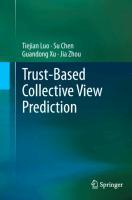trust based collective view prediction di luo tiejian (25 risultati)
Filtri di ricerca
Tipo di articolo
- Tutti i tipi di prodotto
- Libri (25)
- Riviste e Giornali (Nessun altro risultato corrispondente a questo perfezionamento)
- Fumetti (Nessun altro risultato corrispondente a questo perfezionamento)
- Spartiti (Nessun altro risultato corrispondente a questo perfezionamento)
- Arte, Stampe e Poster (Nessun altro risultato corrispondente a questo perfezionamento)
- Fotografie (Nessun altro risultato corrispondente a questo perfezionamento)
- Mappe (Nessun altro risultato corrispondente a questo perfezionamento)
- Manoscritti e Collezionismo cartaceo (Nessun altro risultato corrispondente a questo perfezionamento)
Condizioni Maggiori informazioni
- Nuovo (20)
- Come nuovo, Ottimo o Quasi ottimo (4)
- Molto buono o Buono (Nessun altro risultato corrispondente a questo perfezionamento)
- Discreto o Mediocre (Nessun altro risultato corrispondente a questo perfezionamento)
- Come descritto (1)
Legatura
Ulteriori caratteristiche
- Prima ed. (Nessun altro risultato corrispondente a questo perfezionamento)
- Copia autograf. (Nessun altro risultato corrispondente a questo perfezionamento)
- Sovracoperta (Nessun altro risultato corrispondente a questo perfezionamento)
- Con foto (13)
- Non Print on Demand (17)
Lingua (1)
Prezzo
- Qualsiasi prezzo
- Inferiore a EUR 20 (Nessun altro risultato corrispondente a questo perfezionamento)
- EUR 20 a EUR 45
- Superiore a EUR 45
Spedizione gratuita
- Spedizione gratuita in U.S.A. (Nessun altro risultato corrispondente a questo perfezionamento)
Paese del venditore
Valutazione venditore
-
EUR 103,88
EUR 3,47 per la spedizione in U.S.A.Quantità: Più di 20 disponibili
Aggiungi al carrelloCondizione: New.
-
EUR 105,42
EUR 2,29 per la spedizione in U.S.A.Quantità: Più di 20 disponibili
Aggiungi al carrelloCondizione: New.
-
EUR 104,22
EUR 3,47 per la spedizione in U.S.A.Quantità: Più di 20 disponibili
Aggiungi al carrelloCondizione: New.
-
EUR 110,34
EUR 13,63 per la spedizione da Regno Unito a U.S.A.Quantità: Più di 20 disponibili
Aggiungi al carrelloCondizione: New. In.
-
EUR 124,23
EUR 2,29 per la spedizione in U.S.A.Quantità: Più di 20 disponibili
Aggiungi al carrelloCondizione: As New. Unread book in perfect condition.
-
EUR 114,43
EUR 13,63 per la spedizione da Regno Unito a U.S.A.Quantità: Più di 20 disponibili
Aggiungi al carrelloCondizione: New. In.
-
EUR 114,42
EUR 17,07 per la spedizione da Regno Unito a U.S.A.Quantità: Più di 20 disponibili
Aggiungi al carrelloCondizione: New.
-
EUR 31,87
EUR 105,00 per la spedizione da Germania a U.S.A.Quantità: 1 disponibili
Aggiungi al carrelloCondizione: Sehr gut. Zustand: Sehr gut | Sprache: Englisch | Produktart: Bücher.
-
EUR 31,87
EUR 105,00 per la spedizione da Germania a U.S.A.Quantità: 1 disponibili
Aggiungi al carrelloCondizione: Hervorragend. Zustand: Hervorragend | Sprache: Englisch | Produktart: Bücher.
-
EUR 126,38
EUR 17,07 per la spedizione da Regno Unito a U.S.A.Quantità: Più di 20 disponibili
Aggiungi al carrelloCondizione: As New. Unread book in perfect condition.
-
Trust-Based Collective View Prediction
Editore: Springer-Verlag New York Inc, 2013
ISBN 10: 1461472016 ISBN 13: 9781461472018
Lingua: Inglese
Da: Revaluation Books, Exeter, Regno Unito
EUR 153,60
EUR 11,38 per la spedizione da Regno Unito a U.S.A.Quantità: 2 disponibili
Aggiungi al carrelloHardcover. Condizione: Brand New. 146 pages. 9.75x6.75x0.50 inches. In Stock.
-
Trust-based Collective View Prediction
Editore: Springer New York, Springer US Jun 2013, 2013
ISBN 10: 1461472016 ISBN 13: 9781461472018
Lingua: Inglese
Da: buchversandmimpf2000, Emtmannsberg, BAYE, Germania
EUR 106,99
EUR 60,00 per la spedizione da Germania a U.S.A.Quantità: 2 disponibili
Aggiungi al carrelloBuch. Condizione: Neu. Neuware -Collective view prediction is to judge the opinions of an active web user based on unknown elements by referring to the collective mind of the whole community. Content-based recommendation and collaborative filtering are two mainstream collective view prediction techniques. They generate predictions by analyzing the text features of the target object or the similarity of users¿ past behaviors. Still, these techniques are vulnerable to the artificially-injected noise data, because they are not able to judge the reliability and credibility of the information sources. Trust-based Collective View Prediction describes new approaches for tackling this problem by utilizing users¿ trust relationships from the perspectives of fundamental theory, trust-based collective view prediction algorithms and real case studies.The book consists of two main parts ¿ a theoretical foundation and an algorithmic study. The first part will review several basic concepts and methods related to collective view prediction, such as state-of-the-art recommender systems, sentimental analysis, collective view, trust management, the Relationship of Collective View and Trustworthy, and trust in collective view prediction. In the second part, the authors present their models and algorithms based on a quantitative analysis of more than 300 thousand users¿ data from popular product-reviewing websites. They also introduce two new trust-based prediction algorithms, one collaborative algorithm based on the second-order Markov random walk model, and one Bayesian fitting model for combining multiple predictors.The discussed concepts, developed algorithms, empirical results, evaluation methodologies and the robust analysis framework described in Trust-based Collective View Prediction will not only provide valuable insights and findings to related research communities and peers, but also showcase the great potential to encourage industries and business partners tointegrate these techniques into new applications.Springer Verlag GmbH, Tiergartenstr. 17, 69121 Heidelberg 160 pp. Englisch.
-
Trust-based Collective View Prediction
Editore: Springer New York, Springer US Aug 2015, 2015
ISBN 10: 1489992006 ISBN 13: 9781489992000
Lingua: Inglese
Da: buchversandmimpf2000, Emtmannsberg, BAYE, Germania
EUR 106,99
EUR 60,00 per la spedizione da Germania a U.S.A.Quantità: 2 disponibili
Aggiungi al carrelloTaschenbuch. Condizione: Neu. Neuware -Collective view prediction is to judge the opinions of an active web user based on unknown elements by referring to the collective mind of the whole community. Content-based recommendation and collaborative filtering are two mainstream collective view prediction techniques. They generate predictions by analyzing the text features of the target object or the similarity of users¿ past behaviors. Still, these techniques are vulnerable to the artificially-injected noise data, because they are not able to judge the reliability and credibility of the information sources. Trust-based Collective View Prediction describes new approaches for tackling this problem by utilizing users¿ trust relationships from the perspectives of fundamental theory, trust-based collective view prediction algorithms and real case studies.The book consists of two main parts ¿ a theoretical foundation and an algorithmic study. The first part will review several basic concepts and methods related to collective view prediction, such as state-of-the-art recommender systems, sentimental analysis, collective view, trust management, the Relationship of Collective View and Trustworthy, and trust in collective view prediction. In the second part, the authors present their models and algorithms based on a quantitative analysis of more than 300 thousand users¿ data from popular product-reviewing websites. They also introduce two new trust-based prediction algorithms, one collaborative algorithm based on the second-order Markov random walk model, and one Bayesian fitting model for combining multiple predictors.The discussed concepts, developed algorithms, empirical results, evaluation methodologies and the robust analysis framework described in Trust-based Collective View Prediction will not only provide valuable insights and findings to related research communities and peers, but also showcase the great potential to encourage industries and business partners tointegrate these techniques into new applications.Springer Verlag GmbH, Tiergartenstr. 17, 69121 Heidelberg 160 pp. Englisch.
-
Condizione: New. pp. 146.
-
Trust-based Collective View Prediction
Editore: Springer New York, Springer US, 2013
ISBN 10: 1461472016 ISBN 13: 9781461472018
Lingua: Inglese
Da: AHA-BUCH GmbH, Einbeck, Germania
EUR 109,94
EUR 62,06 per la spedizione da Germania a U.S.A.Quantità: 1 disponibili
Aggiungi al carrelloBuch. Condizione: Neu. Druck auf Anfrage Neuware - Printed after ordering - Collective view prediction is to judge the opinions of an active web user based on unknown elements by referring to the collective mind of the whole community. Content-based recommendation and collaborative filtering are two mainstream collective view prediction techniques. They generate predictions by analyzing the text features of the target object or the similarity of users' past behaviors. Still, these techniques are vulnerable to the artificially-injected noise data, because they are not able to judge the reliability and credibility of the information sources. Trust-based Collective View Prediction describes new approaches for tackling this problem by utilizing users' trust relationships from the perspectives of fundamental theory, trust-based collective view prediction algorithms and real case studies. The book consists of two main parts - a theoretical foundation and an algorithmic study. The first part will review several basic concepts and methods related to collective view prediction, such as state-of-the-art recommender systems, sentimental analysis, collective view, trust management, the Relationship of Collective View and Trustworthy, and trust in collective view prediction. In the second part, the authors present their models and algorithms based on a quantitative analysis of more than 300 thousand users' data from popular product-reviewing websites. They also introduce two new trust-based prediction algorithms, one collaborative algorithm based on the second-order Markov random walk model, and one Bayesian fitting model for combining multiple predictors. The discussed concepts, developed algorithms, empirical results, evaluation methodologies and the robust analysis framework described in Trust-based Collective View Prediction will not only provide valuable insights and findings to related research communities and peers, but also showcase the great potential to encourage industries and business partners tointegrate these techniques into new applications.
-
Trust-based Collective View Prediction
Editore: Springer New York, Springer US, 2015
ISBN 10: 1489992006 ISBN 13: 9781489992000
Lingua: Inglese
Da: AHA-BUCH GmbH, Einbeck, Germania
EUR 111,35
EUR 61,27 per la spedizione da Germania a U.S.A.Quantità: 1 disponibili
Aggiungi al carrelloTaschenbuch. Condizione: Neu. Druck auf Anfrage Neuware - Printed after ordering - Collective view prediction is to judge the opinions of an active web user based on unknown elements by referring to the collective mind of the whole community. Content-based recommendation and collaborative filtering are two mainstream collective view prediction techniques. They generate predictions by analyzing the text features of the target object or the similarity of users' past behaviors. Still, these techniques are vulnerable to the artificially-injected noise data, because they are not able to judge the reliability and credibility of the information sources. Trust-based Collective View Prediction describes new approaches for tackling this problem by utilizing users' trust relationships from the perspectives of fundamental theory, trust-based collective view prediction algorithms and real case studies. The book consists of two main parts - a theoretical foundation and an algorithmic study. The first part will review several basic concepts and methods related to collective view prediction, such as state-of-the-art recommender systems, sentimental analysis, collective view, trust management, the Relationship of Collective View and Trustworthy, and trust in collective view prediction. In the second part, the authors present their models and algorithms based on a quantitative analysis of more than 300 thousand users' data from popular product-reviewing websites. They also introduce two new trust-based prediction algorithms, one collaborative algorithm based on the second-order Markov random walk model, and one Bayesian fitting model for combining multiple predictors. The discussed concepts, developed algorithms, empirical results, evaluation methodologies and the robust analysis framework described in Trust-based Collective View Prediction will not only provide valuable insights and findings to related research communities and peers, but also showcase the great potential to encourage industries and business partners tointegrate these techniques into new applications.
-
EUR 167,63
EUR 28,45 per la spedizione da Regno Unito a U.S.A.Quantità: 1 disponibili
Aggiungi al carrelloPaperback. Condizione: Like New. Like New. book.
-
Trust-based Collective View Prediction [Hardcover] Luo, Tiejian; Chen, Su; Xu, Guandong and Zhou, Jia (eng)
Da: Brook Bookstore On Demand, Napoli, NA, Italia
EUR 86,24
EUR 5,50 per la spedizione da Italia a U.S.A.Quantità: Più di 20 disponibili
Aggiungi al carrelloCondizione: new. Questo è un articolo print on demand.
-
Trust-based Collective View Prediction
Editore: Springer New York Aug 2015, 2015
ISBN 10: 1489992006 ISBN 13: 9781489992000
Lingua: Inglese
Da: BuchWeltWeit Ludwig Meier e.K., Bergisch Gladbach, Germania
EUR 106,99
EUR 23,00 per la spedizione da Germania a U.S.A.Quantità: 2 disponibili
Aggiungi al carrelloTaschenbuch. Condizione: Neu. This item is printed on demand - it takes 3-4 days longer - Neuware -Collective view prediction is to judge the opinions of an active web user based on unknown elements by referring to the collective mind of the whole community. Content-based recommendation and collaborative filtering are two mainstream collective view prediction techniques. They generate predictions by analyzing the text features of the target object or the similarity of users' past behaviors. Still, these techniques are vulnerable to the artificially-injected noise data, because they are not able to judge the reliability and credibility of the information sources. Trust-based Collective View Prediction describes new approaches for tackling this problem by utilizing users' trust relationships from the perspectives of fundamental theory, trust-based collective view prediction algorithms and real case studies. The book consists of two main parts - a theoretical foundation and an algorithmic study. The first part will review several basic concepts and methods related to collective view prediction, such as state-of-the-art recommender systems, sentimental analysis, collective view, trust management, the Relationship of Collective View and Trustworthy, and trust in collective view prediction. In the second part, the authors present their models and algorithms based on a quantitative analysis of more than 300 thousand users' data from popular product-reviewing websites. They also introduce two new trust-based prediction algorithms, one collaborative algorithm based on the second-order Markov random walk model, and one Bayesian fitting model for combining multiple predictors. The discussed concepts, developed algorithms, empirical results, evaluation methodologies and the robust analysis framework described in Trust-based Collective View Prediction will not only provide valuable insights and findings to related research communities and peers, but also showcase the great potential to encourage industries and business partners to integrate these techniques into new applications. 160 pp. Englisch.
-
Trust-based Collective View Prediction
Editore: Springer New York Jun 2013, 2013
ISBN 10: 1461472016 ISBN 13: 9781461472018
Lingua: Inglese
Da: BuchWeltWeit Ludwig Meier e.K., Bergisch Gladbach, Germania
EUR 106,99
EUR 23,00 per la spedizione da Germania a U.S.A.Quantità: 2 disponibili
Aggiungi al carrelloBuch. Condizione: Neu. This item is printed on demand - it takes 3-4 days longer - Neuware -Collective view prediction is to judge the opinions of an active web user based on unknown elements by referring to the collective mind of the whole community. Content-based recommendation and collaborative filtering are two mainstream collective view prediction techniques. They generate predictions by analyzing the text features of the target object or the similarity of users' past behaviors. Still, these techniques are vulnerable to the artificially-injected noise data, because they are not able to judge the reliability and credibility of the information sources. Trust-based Collective View Prediction describes new approaches for tackling this problem by utilizing users' trust relationships from the perspectives of fundamental theory, trust-based collective view prediction algorithms and real case studies. The book consists of two main parts - a theoretical foundation and an algorithmic study. The first part will review several basic concepts and methods related to collective view prediction, such as state-of-the-art recommender systems, sentimental analysis, collective view, trust management, the Relationship of Collective View and Trustworthy, and trust in collective view prediction. In the second part, the authors present their models and algorithms based on a quantitative analysis of more than 300 thousand users' data from popular product-reviewing websites. They also introduce two new trust-based prediction algorithms, one collaborative algorithm based on the second-order Markov random walk model, and one Bayesian fitting model for combining multiple predictors. The discussed concepts, developed algorithms, empirical results, evaluation methodologies and the robust analysis framework described in Trust-based Collective View Prediction will not only provide valuable insights and findings to related research communities and peers, but also showcase the great potential to encourage industries and business partners to integrate these techniques into new applications. 160 pp. Englisch.
-
Trust-based Collective View Prediction
Da: moluna, Greven, Germania
EUR 92,27
EUR 48,99 per la spedizione da Germania a U.S.A.Quantità: Più di 20 disponibili
Aggiungi al carrelloGebunden. Condizione: New. Dieser Artikel ist ein Print on Demand Artikel und wird nach Ihrer Bestellung fuer Sie gedruckt. Outlines recent theoretical advances and algorithmic innovations conducted in trust-based collective view predictionAnalyzes the existing vulnerabilities of the content-based recommendation and collaborative filtering techniques, and proposes new,.
-
Trust-based Collective View Prediction
Da: moluna, Greven, Germania
EUR 92,27
EUR 48,99 per la spedizione da Germania a U.S.A.Quantità: Più di 20 disponibili
Aggiungi al carrelloCondizione: New. Dieser Artikel ist ein Print on Demand Artikel und wird nach Ihrer Bestellung fuer Sie gedruckt. Outlines recent theoretical advances and algorithmic innovations conducted in trust-based collective view predictionAnalyzes the existing vulnerabilities of the content-based recommendation and collaborative filtering techniques, and proposes new,.
-
Trust-based Collective View Prediction
Da: preigu, Osnabrück, Germania
EUR 96,40
EUR 70,00 per la spedizione da Germania a U.S.A.Quantità: 5 disponibili
Aggiungi al carrelloBuch. Condizione: Neu. Trust-based Collective View Prediction | Tiejian Luo (u. a.) | Buch | xi | Englisch | 2013 | Springer US | EAN 9781461472018 | Verantwortliche Person für die EU: Springer Verlag GmbH, Tiergartenstr. 17, 69121 Heidelberg, juergen[dot]hartmann[at]springer[dot]com | Anbieter: preigu Print on Demand.
-
Trust-Based Collective View Prediction
Da: Majestic Books, Hounslow, Regno Unito
EUR 177,25
EUR 7,40 per la spedizione da Regno Unito a U.S.A.Quantità: 4 disponibili
Aggiungi al carrelloCondizione: New. Print on Demand pp. 146.
-
Trust-Based Collective View Prediction
Da: Biblios, Frankfurt am main, HESSE, Germania
EUR 178,43
EUR 9,95 per la spedizione da Germania a U.S.A.Quantità: 4 disponibili
Aggiungi al carrelloCondizione: New. PRINT ON DEMAND pp. 146.
















